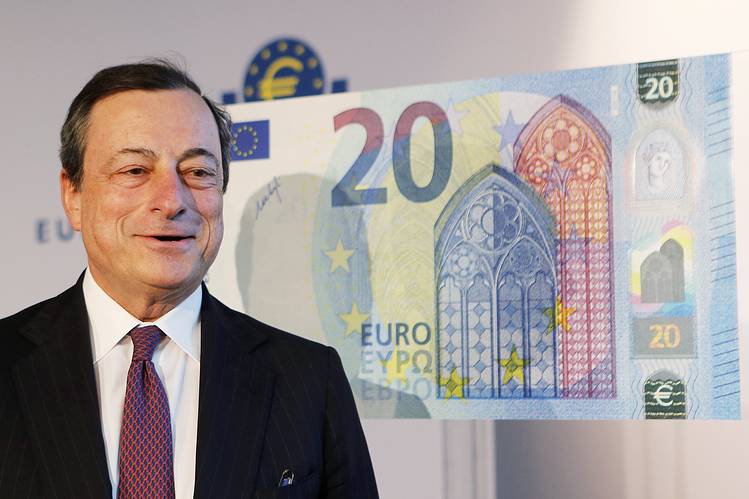- Draghi Worries About U.S. Protectionism as Euro Area Strengthens
Mario Draghi has become the latest European policy maker to tell the U.S. that it might be heading down the wrong path on trade.
The European Central Bank president used an appearance on Monday to tout the euro area’s four-year recovery and say that the key risks are now from external factors. Then he turned his attention to the rhetoric coming from across the Atlantic.
“The neo-protectionist stances that have been stated in the United States are certainly of concern.”
Draghi was speaking to the European Parliament in Brussels just a day after German Chancellor Angela Merkel bemoaned that reliable relationships forged since the end of World War II “are to some extent over,” signaling a potentially significant shift in the ties between the U.S. and its trading partners under the administration of President Donald Trump. It also comes amid a euro-area upturn that is being bolstered by domestic consumption as much as exports.
“The concerns of Mario Draghi are maybe just an echo of the comments made earlier by Merkel after the Group of Seven summit,” said Vincent Juvyns, global market strategist at J.P. Morgan Asset Management. “While the global environment is important for Europe, the economic momentum seems to be self-sustaining with local factors driving gross domestic product up at the moment.”
On his nine-day foreign trip, Trump hectored NATO allies for not spending enough on defense, and brought the U.S. to the brink of exiting the global Paris climate accord. He also called Germany’s trade surplus “very bad.”
Merkel, who is campaigning for a fourth term ahead of September elections, has since said that European leaders are “committed trans-Atlanticists” and consider strong relations with the U.S. “of great importance to all of us.”
Still, the Trump administration’s attitude failed to find favor with another ECB speaker on Monday, Austrian central-bank Governor Ewald Nowotny.
“Perceiving the world economy as an endeavor where the expansion of one country results in a loss for the rest is a misperception that can become outright dangerous if it forms the basis of international policy making.”
Governments have stepped up their warnings against a resurgence of protectionism, arguing that policies supposedly supporting domestic economies often do more harm than good. At the same time, they have acknowledged that globalization — while having extraordinary benefits — also created losers who must be better taken into account.
In the wake of Trump’s election, the U.K.’s vote to leave the European Union, and France’s flirtation with electing a euro-skeptic president, Draghi was at pains to make that point as well.
“What’s happened in last 15-20 years is that free trade and globalization produced immense benefits but also produced people who didn’t actually share the benefits. We have to do much better in sharing the benefits with everybody who has participated in the process.”
Draghi contrasted the caution about the global environment with the brightening outlook for the euro area. In his Brussels hearing, he described the currency bloc’s economic upswing as “increasingly solid” and broadening.
That kind of talk has fueled speculation over when the central bank will finally start to unwind its 2.3 trillion-euro ($2.6 trillion) bond-purchase program. That’s a topic Draghi declined to encourage, hinting that there’s little urgency to do much at the next policy meeting on June 8.
“We remain firmly convinced that an extraordinary amount of monetary policy support, including through our forward guidance, is still necessary for the present level of under-utilized resources to be re-absorbed and for inflation to return to and durably stabilize around levels close to 2 percent within a meaningful medium-term horizon.”
He may get more ammunition for that view this week. While data on Tuesday is likely to show economic confidence at the strongest in almost a decade, and figures the next day will probably reveal an unemployment rate at the lowest since early 2009, inflation is far less convincing.
Economists predict that data due Wednesday will show the inflation rate fell to 1.5 percent in May from 1.9 percent. More worryingly for the central bank, core inflation is slated to slow to 1 percent.


 Forex2 weeks ago
Forex2 weeks ago


 Naira2 weeks ago
Naira2 weeks ago
 Billionaire Watch1 week ago
Billionaire Watch1 week ago




 Naira2 weeks ago
Naira2 weeks ago




 Naira1 week ago
Naira1 week ago




 Naira4 weeks ago
Naira4 weeks ago
 Nigerian Exchange Limited4 weeks ago
Nigerian Exchange Limited4 weeks ago


 Naira3 days ago
Naira3 days ago

















